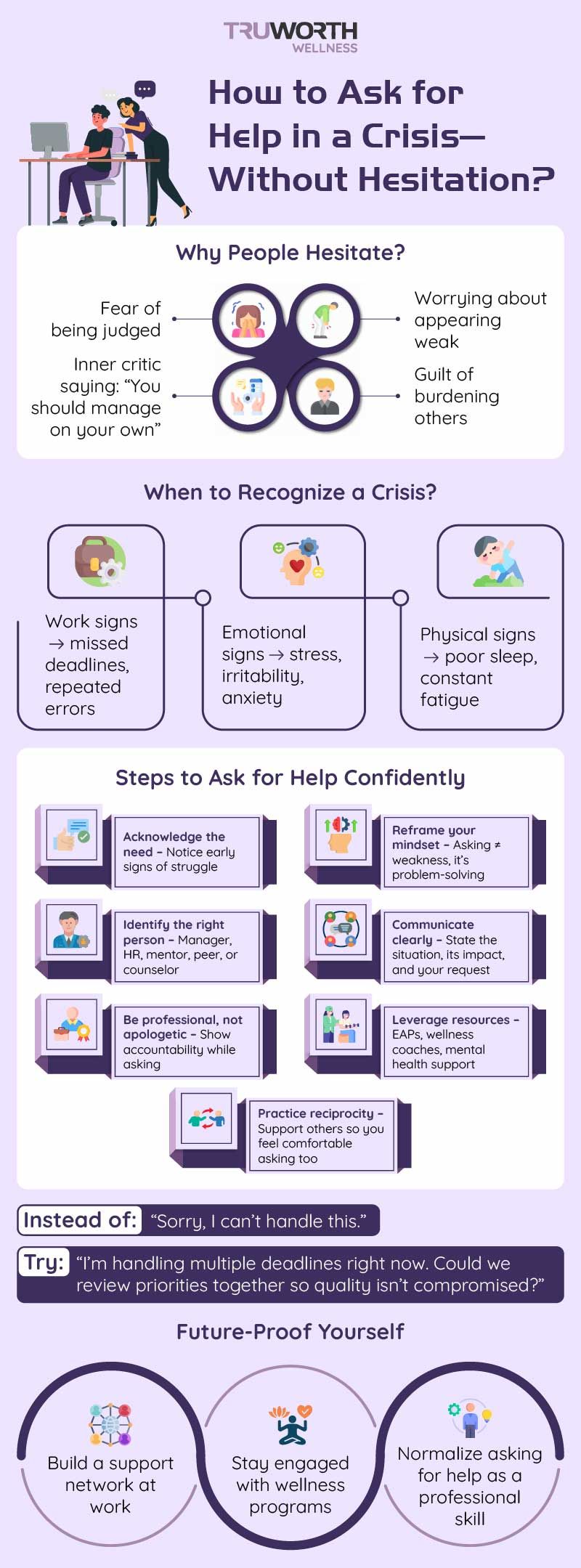How To Ask For Help Amidst Crisis—Without Hesitation?

A crisis is not a matter of if, but when. Whether it’s an overwhelming workload, a critical project setback, a personal emergency, or an unexpected mental health struggle, every professional faces moments when they cannot carry the burden alone. Yet, in such situations, asking for help often feels like the hardest step to take.
Why? Because hesitation creeps in. People worry about being judged, appearing weak, or disrupting others’ schedules. This hesitation, however, can make the crisis worse, causing burnout, mistakes, or missed opportunities for recovery.
The truth is: asking for help is not a weakness—it’s a corporate survival skill. It is a strategic move that allows professionals to regain balance, safeguard mental health, and keep work on track. In fact, organizations that normalize support-seeking often build healthier, more resilient work cultures.
So, how do you overcome hesitation and ask for help when you need it most? Let’s break it down.

1. Recognize the Early Signs of a Crisis
The first step to seeking help is acknowledging that you’re heading into crisis mode. In corporate settings, crises don’t always look like dramatic breakdowns—they are often subtle at first:
- Work signs: Missing deadlines, forgetting tasks, or making repeated errors.
- Emotional signs: Feeling drained, anxious, or unusually irritable.
- Physical signs: Disturbed sleep, frequent headaches, or fatigue.
Recognizing these signals early helps you take proactive action. If you wait too long, the hesitation to seek help may only grow.
2. Reframe Asking for Help as a Professional Skill
Hesitation usually comes from a negative mindset: “If I ask for help, they’ll think I can’t handle it.” In reality, organizations value employees who know when to seek support instead of allowing a crisis to escalate.
Think of it this way: if a project is at risk because of resource shortages, managers don’t hesitate to request reinforcements—why should it be different at the personal level? By reframing help-seeking as problem-solving, you eliminate guilt and build confidence in reaching out.
3. Choose Whom to Approach
In corporate settings, the type of crisis determines whom you should approach:
- For workload issues: A direct manager or project lead.
- For emotional or personal struggles: HR, wellness counselors, or employee assistance programs.
- For skill-based gaps: A peer, mentor, or subject matter expert.
Having clarity about whom to reach out to reduces hesitation. It also ensures that your concerns are addressed by someone equipped to support you effectively.
4. Be Honest but Professional in Your Ask
When reaching out, many people over-explain or under-explain, which leads to more stress. The key is clarity with professionalism.
Here’s a simple framework:
- State the situation briefly: “I am currently managing multiple overlapping deadlines.”
- Express the impact: “I’m worried that without support, the quality of output may suffer.”
- Make a clear request: “Could I delegate a part of X, or could we prioritize tasks together?”
This ensures you’re not just dumping your stress but showing responsibility while seeking practical solutions.
5. Normalize Support-Seeking as a Two-Way Street
One of the best ways to reduce hesitation is to build a culture of reciprocity. If you’ve helped colleagues in the past, you’ll feel less guilty about asking for support yourself. Similarly, when you openly acknowledge receiving help, you normalize it for others.
Leaders especially play a role here. When managers model vulnerability—sharing how they sought guidance during tough times—it sets the tone for employees to seek help without hesitation.
6. Use Available Resources Without Shame
Corporate organizations today invest heavily in Employee Assistance Programs (EAPs), mental health helplines, wellness coaches, and skill-building workshops. Yet, many employees hesitate to use them, fearing it reflects poorly on their performance.
In reality, these resources exist precisely to help employees thrive in moments of crisis. Using them is not only smart but also aligned with the company’s vision of a sustainable workforce.
7. Silence the Inner Critic
Often, the biggest hesitation comes not from others, but from our own inner voice. The critic says:
- “You should be able to handle this on your own.”
- “Everyone else is managing—why can’t you?”
- “If you ask for help, you’ll lose credibility.”
But here’s the truth: no one succeeds alone in the corporate world. Even the best leaders rely on teams, advisors, and mentors. Silencing the inner critic means reminding yourself that asking for help is a mark of strength, not inadequacy.
8. Prepare for the Future—Build a Support System
Instead of waiting for the next crisis, build a safety net now. Cultivate professional relationships, check in with mentors, and stay engaged with wellness initiatives. This way, when a crisis strikes, you’ll know exactly whom to reach out to—and hesitation won’t have room to grow.
Final Thoughts
In corporate life, crisis is inevitable, but suffering in silence is not. Asking for help is not about weakness, burdening others, or losing credibility—it is about resilience, responsibility, and creating a sustainable career. The sooner you normalize this mindset, the faster you’ll bounce back from crises without burning out.
A Gentle Reminder from Truworth Wellness
At Truworth Wellness, we believe that no employee should struggle alone during tough times. Our Employee Assistance Programs, mental health counseling, and wellness initiatives are designed to provide timely support for professionals in need. Whether you’re facing work stress, emotional challenges, or personal setbacks, help is just one conversation away.
Because in the end, asking for help isn’t hesitation—it’s empowerment.